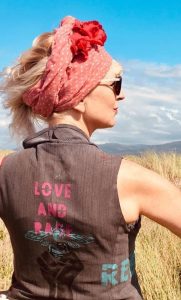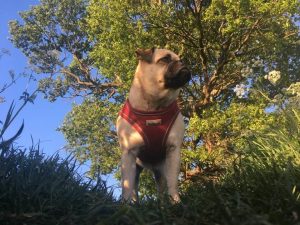Sweet lockdown rambles and spacious reveries
20th May 2020
Hilary Cox Condron
This week is International Biodiversity Week, as well as Mental Health Awareness Week. Confined to our homes, gardens and ‘local patch’ many of us are noticing and enjoying the nature on our doorstep more than ever.
Hilary Cox Condron is a Cambridge based artist and activist, and she’s been taking regular early morning walks on the Cambridge meadows and the surrounding village footpaths with her dog Zelda Zen, and her camera. Here is the result!
‘I hope your rambles have been sweet, and your reveries spacious’
(Emily Dickinson)
Rolling mists and haze-fire.
Still water, clear sky.
Fresh air and flat lands.
An unbroken harmony of birdsong and the buzz of nature.
I have never seen Cambridge so beautiful.
It’s phenomenal.
I feel like all my senses have been ramped up. I have always felt lucky to live in a city with so many open spaces and tucked away footpaths to explore – but in this period these walks with Zelda Zen and the dawn chorus are holding me. I am excited to start each day – amongst all the uncertainty, anger and grief, I feel absolute love deep in my bones as I step out on to the commons and watch the mist unfurl across the Cam.
‘… and my soul gets caught in it
hung by the heels
In water…’
(from Mist, a poem by Alice Oswald)
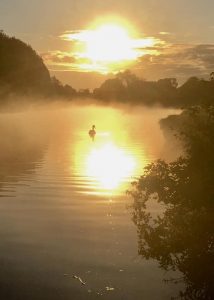
The fox.
The deer.
The cormorant drying its wings.
A raft of ducks.
A mute swan cob and pen in a beautiful courtship dance…
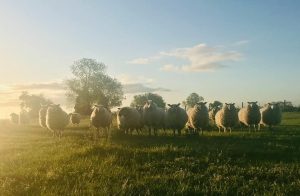
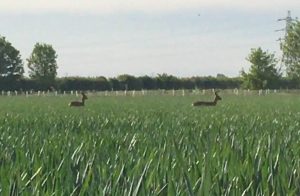
‘Inspired by Robert Macfarlane’s Lost Words and Landmarks – I’m trying to remember and use the words of nature.
I stop to greet trees along the way: the big oak in the middle of the footpath between Horningsea and Clayhithe is a favourite. I wonder at the stories it holds, the ruggedness of its age as it gently creeks above me.
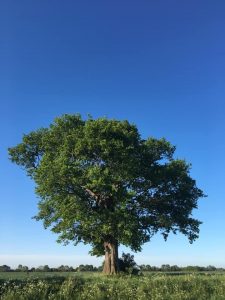
‘The Common Cormorant or shag
Lays eggs inside a paper bag.
The reason you will see no doubt
It is to keep the lightning out.
But what these unobservant birds
Have never noticed is that herds
Of wandering bears may come with buns
And steal the bags to hold the crumbs.
(Christopher Isherwood)
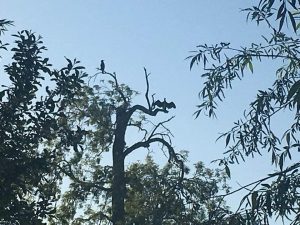
I watched a Little Egret on Ditton Meadows. I haven’t seen one on this stretch of the river before. And never one so sassy.
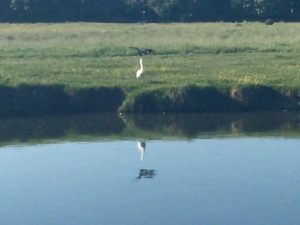
‘…they opened their wings
softly and stepped
over every dark thing.’
(from Egrets, a poem by Mary Oliver)
Egrets were very common up until the late 1800’s, when plumes became fashionable and they were hunted to decorate hats. (Apparently, in the first three months of 1885, 750,000 egret skins were sold in London alone, and a record from 1887 shows that one London dealer sold two million egret skins). Grim. But accepted as totally normal then.
They neared extinction.
This inspired a small group of women to establish the Royal Society for the Protection of Birds (RSPB), founded in 1889 by Emily Williamson at her home in Manchester, campaigning to end the use of bird skins and feathers in the fashion industry.
Egrets.
Hope.
And a reminder that what we think of as ‘normal’ can change.
And that ordinary people can make that change happen.
Time in nature helps us focus (I often delivered workshops outside, but otherwise played recordings of birdsong whilst creating – back in the day of community gatherings…). Being quiet – resetting our brains. Remembering who we are and what is at our core.
In Rob Hopkins book ‘From What Is to What If’, he writes: ‘The imagination draws from the palatte of options and possibilities that we carry in our memories. It reassembles, cuts and pastes, and makes unique combinations of experiences and ideas we have seen before. The greater the diversity in the natural world around us, and our greater our capacity to notice it, the more we can draw on it as our muse for how to exist in the world.’
And right now, we need to stimulate our imagination more that ever – to nurture the creativity at the core of us, and to visualise how a new future can look – not just as we move through this lockdown, but for nature herself.
Hilary is a Cambridge based artist and activist.
She is one of the artists making ‘invitations to create’ with Cambridge Curiosity and Imagination , helping people rediscover the world on their doorsteps in creative ways.
The World of Tomorrow
How can people live in harmony with nature?
Participate in this family creative activity with Hilary and share your images with the Museum of Zoology and Cambridge Conservation Initiative
